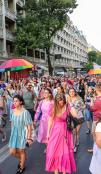EU helps revive old crafts: the pottery adventure of Gen Z children from Veles

"When I first came (to the workshops), it was strange to me, but over time it became more interesting. Now, I prefer to make clay objects rather than play games on my mobile phone. Pottery is really an interesting craft," says Antonio, one of the most dedicated students in the group.
In the first half of the 20th century, many families in Veles were involved in pottery, and some products were even exported to Western Europe. The great Macedonian poet Kocho Racin, whose socially engaged poetry is a symbol of the workers' struggle, also dabbled in pottery. Some of the ceramic objects he made himself are exhibited in his memorial house – one of the best examples of traditional Veles architecture.
Goce Stanchev is one of the last four ceramic artists in Veles. He led the pottery workshops organised by the Razboj NGO as part of the project "Ethnic Creative Workshops for Revival of Old Crafts," funded by the EU under the Regional Programme on Local Democracy in the Western Balkans - ReLOaD, and supported by UNDP.
“At first, we were sceptical, but it turned out that the children had a great interest - a total of 25 students from primary schools in Veles signed up. Some of them were truly talented, and I offered them to come and learn in my workshop. If we manage to turn two out of 20 children into potters, it will be a great success," says Stanchev.
Anastasija, who was also part of the workshops, describes them as ‘fun’, especially when the participants engaged in drawing and then working on the wheel. “It would be nice to keep pottery as a craft because it is part of the tradition of our country," she says.
Stanchev believes that it is necessary for the country to get involved in order to revive old crafts, and pottery should be included in art classes as part of the mandatory curriculum. "There is a future in pottery, but encouragement is needed. My wife and I have been professionally engaged in this line of work for 15 years. There is a great demand in the market, but there is no one to work. There are only 7-8 artists in the whole country. I am proof that one can make a living from pottery."
One of the main goals of the ReLOaD regional programme is to encourage partnerships between municipalities and local civil society organisations, as well as to establish a methodology for transparent allocation of financial resources for projects benefiting citizens.
"The Municipality of Veles constantly supports us. All workshops for reviving old crafts are held in art houses provided to us by the municipality. We have good conditions, and that is why these workshops are unique in our country," says Stanchev.
This was one of the 50 projects implemented in eight municipalities across the country through ReLOaD in the past three years. These projects mainly focused on supporting young people, promoting social cohesion and inclusion, environmental protection, and promoting the cultural heritage and tourism potential of the country.





